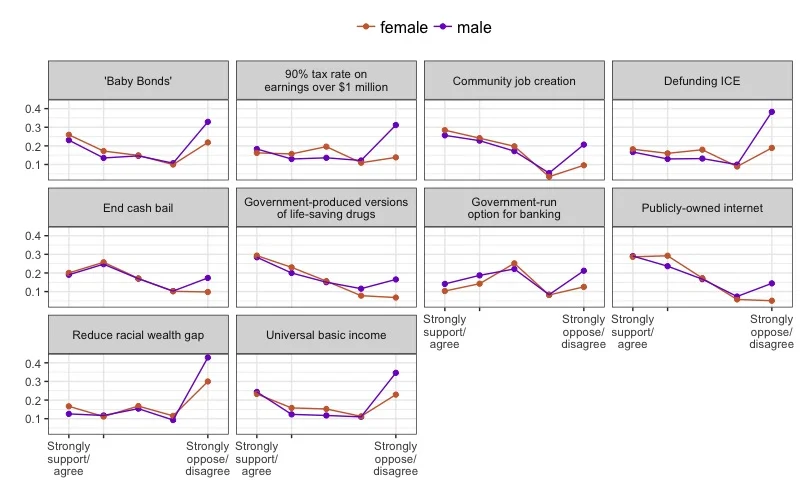data for politics #11: The Gender Gap In Voting Is Reflected In Policy Support
By Anthony Rentsch (@Anthony_Rentsch)
The gender gap in party affiliation is a well-documented phenomenon. Women tend to identify as Democrats and vote Democratic more often than men and men tend to identify as Republicans and vote Republican more often than women. The trend is relatively consistent across time and across data sources (for more, see the Pew Research Center, FiveThirtyEight, and Alexander Agadjanian’s recent blog post on Data For Progress).
Recent polling conducted by Data For Progress and YouGov Blue shows that this gap is also present examining support for progressive policies. While there is encouragingly high levels of support for a variety of progressive policies, men are also less likely than women to support progressive policies. The figure below shows estimates of male and female support for various progressive policies. For each of the ten policies, men are more likely to strongly oppose or disagree than women (high definition chart).
There’s evidence that this gap is driven in large part by the views of white men in particular, as Sean McElwee wrote in another recent Data For Progress blog post. But the gender gap also holds up across education and age lines (high definition chart).
Below, I analyze support across gender and education, and analyze the share strongly disagreeing with the policy. This gives a sense of the intensity of opposition. Notably, on issues related to inequality and race, we see some of the largest gaps (defunding ICE, 90% tax rates, universal basic income, baby bonds and reparations).
Examining across age and gender, I find notably that young people are much more progressive on almost every issue included in the survey, and young women are less likely to disagree then young men. There is no issue for which more than 20 percent of young women express “strong disagreement" (high definition chart).
The growing gender gap in partisanship is also reflected in policy preferences. Even though most of these issues haven’t been heavily paritsanized, we still see large and consistent gender gaps, with women less likely to express strong opposition to progressive policies.
Anthony Rentsch (@Anthony_Rentsch) is a data analytics fellow at Catalist.
Based on Data for Progress (@DataProgress) / YouGov Blue polling fielded between July 13 and 16 with 1,515 voting eligible adults, weighted to be nationally representative. See question wording and more data analysis here.




